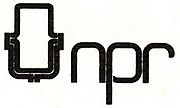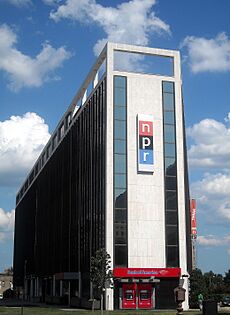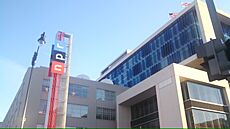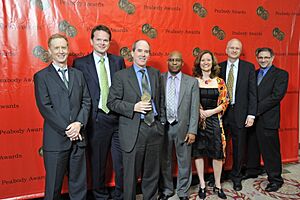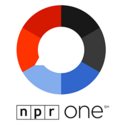NPR facts for kids
| Type | Public radio network |
|---|---|
| Country | United States |
| First air date | April 20, 1971 |
| Availability | Global |
| Founded | February 26, 1970 |
| Endowment | |
| Revenue | |
| Net income | ▲ $−4.45 million (2023) |
| Headquarters |
|
| Broadcast area |
|
| Owner | NPR's member public radio stations |
| Key people | Katherine Maher (CEO) |
| Former names |
|
| Affiliation | WRN Broadcast |
National Public Radio (NPR) is an American organization that creates and shares radio programs. It is based in Washington, D.C., with another main office in Culver City, California. NPR sends its programs to over 1,000 public radio stations across the United States.
NPR gets its money from different places. Member radio stations pay fees, companies sponsor programs, and it receives grants from the Corporation for Public Broadcasting. Most of NPR's member stations are owned by groups that don't aim to make a profit. These include schools, colleges, and universities. NPR makes its own content and is not controlled by the government or any company.
NPR creates both news and cultural shows. Its most famous news programs are Morning Edition and All Things Considered. These shows are played during busy travel times and are very popular across the country. As of March 2018, these shows reached millions of listeners each week.
NPR also manages a system that sends its programs and other shows to radio stations. This system helps distribute programs from other groups like American Public Media. It also acts as a main point for the Emergency Alert System. You can listen to NPR shows online, on mobile phones, and as podcasts. Some NPR stations also play programs from the BBC World Service.
Contents
What's in a Name?
The official name of the organization is National Public Radio. However, it is also known by its shorter name, NPR. In 2010, NPR decided to use "NPR" more often when talking about itself. This was because most people already called it NPR. The longer name, National Public Radio, has been its legal name since 1970.
NPR's Journey Through Time
How NPR Started in the 1970s
NPR began on February 26, 1970. It took the place of another radio network called the National Educational Radio Network. This happened after a law called the Public Broadcasting Act of 1967 was passed. This law also created the Public Broadcasting Service (PBS) for television.
Donald Quayle became NPR's first president. He started with 30 employees and 90 local radio stations. Their first studios were in Washington, D.C..
NPR's first broadcast was on April 20, 1971. It covered important hearings about the Vietnam War. The popular afternoon news show All Things Considered started on May 3, 1971. It was first hosted by Robert Conley. Later, in 1979, Morning Edition began, with Bob Edwards as its first host.
Challenges and Growth in the 1980s
In 1983, NPR faced a big problem. It had spent too much money and was nearly $7 million in debt. After some changes, the Corporation for Public Broadcasting helped NPR avoid going bankrupt.
As a result, NPR changed how it received money. Instead of getting money directly from the Corporation for Public Broadcasting, local stations would get the money. Then, these stations would pay NPR to use its programs. NPR also made its satellite service a shared project. This allowed other radio shows to be sent out nationally. It took NPR about three years to pay off its debt.
Changes in the 1990s
Delano Lewis became NPR's CEO and president in 1994. He left in 1998. Later that year, Kevin Klose took over as president and CEO.
Expanding in the 2000s
In 2002, NPR opened a new production center called NPR West in Culver City, California. This new office helped NPR create more programs and cover the western United States better. It also served as a backup in case something happened at the Washington, D.C., headquarters.
In 2003, NPR received a huge gift of $235 million from Joan B. Kroc. This was the largest gift ever given to a cultural organization at that time. This money helped NPR expand its news team and lower fees for some member stations.
NPR started offering podcasts in 2005. By 2015, NPR's podcasts were downloaded millions of times and became very popular.
The 2010s: New Headquarters and Digital Growth
In 2013, NPR moved to a new headquarters in Washington, D.C. The new building was once a telephone company warehouse. The first show broadcast from the new studios was Weekend Edition Saturday.
NPR also focused on digital media. It used social media platforms like Twitter and Facebook to reach more people. In 2018, NPR launched a new technology called Remote Audio Data (RAD). This helps podcast creators understand how people listen to their shows while keeping user privacy safe.
Recent Events in the 2020s
In late 2022, NPR announced it needed to reduce spending due to less money coming in from sponsors. In February 2023, NPR had to lay off about 10% of its staff because of reduced advertising revenue.
In January 2024, Katherine Maher was named NPR's new CEO. She started her role in late March 2024.
On August 1, 2025, the Corporation for Public Broadcasting, which was a major funder of NPR, shut down. This happened because it lost all its federal funding.
How NPR is Managed
NPR is a membership organization. This means that local radio stations are members of NPR. To be a member, a station must be non-commercial, have at least five full-time employees, and broadcast for at least 18 hours a day. They also cannot be solely focused on religious broadcasting or classroom learning. Each member station gets one vote at NPR's yearly meetings.
A board of directors is elected to manage NPR's daily operations and budget. As of January 2024, the board included managers from NPR member stations, public members, and the NPR President & CEO.
NPR also has a Public Editor. This person listens to questions, comments, and criticisms from listeners. The Public Editor reports to the president and CEO. Kelly McBride became the Public Editor for NPR in April 2020.
Leaders of NPR
Here is a list of the people who have led NPR:
- Donald Quayle (1970–1973)
- Lee Frischknecht (1973–1977)
- Frank Mankiewicz (1977–1983)
- Douglas J. Bennet (1983–1993)
- Delano Lewis (1993–1998)
- Kevin Klose (1998–2008)
- Vivian Schiller (2009–2011)
- Gary Knell (2011–2013)
- Paul Haaga (2013–2014)
- Jarl Mohn (2014–2019)
- John F. Lansing (2019–2024)
- Katherine Maher (Since 2024)
How NPR Gets Money
In 2020, NPR expected to have about $250 million in revenue. This was a small decrease due to the COVID-19 pandemic.
NPR's Funding History
In the 1970s and early 1980s, most of NPR's money came from the government. In the 1980s, there were efforts to make NPR less reliant on government support. However, the financial crisis in 1983 forced NPR to change quickly.
Funding in Recent Years
In 2009, about 11.3% of all public radio stations' money came from federal sources. This was mainly through the Corporation for Public Broadcasting. By 2012, this figure was 10.9%.
In 2010, NPR's total money was $180 million. Most of this came from fees paid by member stations, grants from foundations, and sponsorships. About half of NPR's money comes from fees it charges member stations for programs. Member stations get their money from listener donations, corporate sponsors, and government funding.
In 2011, NPR started its own online advertising network. This allowed member stations to run targeted ads from national sponsors. This created new ways for NPR to earn money.
Sponsor Messages vs. Commercials
NPR radio shows do not have traditional commercials. Instead, they have short messages from sponsors. These messages are called "underwriting spots." They can include company slogans or descriptions of products. However, they cannot directly promote products or services like regular commercials. These rules apply only to radio broadcasts, not to NPR's online platforms.
Who Listens to NPR?
According to NPR's 2022 data, about 30.7 million people listened to its programs each week. This number was highest in 2017, with 37.7 million listeners.
Listener Information
NPR listeners tend to be well-educated. A 2012 survey showed that many regular listeners were college graduates. The audience is almost evenly split between male and female listeners. NPR listeners also tend to have higher incomes.
Surveys have shown that NPR's audience often leans towards the Democratic Party. A 2019 survey found that most listeners identified as Democrats or leaning Democratic.
Trust in NPR
In 2005, a survey found that NPR was the most trusted news source in the United States. A 2014 poll showed that 55% of adults who knew about NPR trusted it. This was similar to the trust levels for other major news networks. A 2025 survey found that 53% of voters trusted public media in the U.S.
Listener Numbers
NPR stations use Nielsen ratings to measure their listeners. NPR's morning news program, Morning Edition, is its most popular show. It had 14.63 million listeners a week in 2017. All Things Considered, the afternoon news show, was a close second with 14.6 million listeners a week.
NPR Online and on Your Phone
NPR has a long history in digital media. In 2011, NPR reorganized its digital services. One part focused on NPR-branded services, and another continued to offer services to public TV stations.
NPR uses a system called Core Publisher for its online news. This system is built on Drupal, which is a free and open-source content management system.
NPR has used social media like Twitter to share information. In 2010, NPR found that its Twitter followers were younger and used social media more often. They also accessed content through NPR's website, podcasts, and mobile apps. NPR also has a popular Facebook page.
In 2018, NPR helped buy the podcasting app Pocket Casts. Later, in 2021, another company called Automattic bought Pocket Casts from NPR.
NPR One App
In July 2014, NPR launched the NPR One app. This app makes it easy for listeners to stream local NPR stations live and listen to NPR podcasts. The app plays content automatically and is easy to use. NPR One is available on many devices, including smartphones, web browsers, and smart speakers. The New York Times called NPR One one of the best apps in 2016.
NPR Programs
Shows Made by NPR
As of October 2024, here are some of the programs NPR still produces:
News and Current Events (Radio)
NPR creates daily news programs that are broadcast live on member stations.
- Morning Edition: A morning news show hosted by Leila Fadel, Steve Inskeep, Michel Martin, and A Martínez.
- Weekend Edition: The weekend version, hosted by Scott Simon (Saturdays) and Ayesha Rascoe (Sundays).
- All Things Considered: An evening news show hosted by Ailsa Chang, Mary Louise Kelly, Ari Shapiro, and Juana Summers.
- Weekend All Things Considered: The weekend version, hosted by Scott Detrow.
- Here and Now: A midday news show hosted by Deepa Fernandes, Scott Tong, and Robin Young. This show is made with WBUR.
- NPR also produces short 5-minute news updates every hour, all day long.
News and Current Events (Podcasts)
- Up First: A morning news podcast from the hosts of Morning Edition and Weekend Edition.
- Consider This: An afternoon news podcast from the hosts of All Things Considered and Weekend All Things Considered.
- NPR News Now: A podcast feed for the hourly news updates.
- NPR Politics Podcast: Hosted by Tamara Keith and Asma Khalid.
- State of the World: A news podcast with international stories from NPR journalists.
Stories and Culture Programs
- Alt.Latino: A podcast about Latino arts and culture, hosted by Felix Contreras and Anamaria Sayre.
- NPR's Book of the Day: A podcast with interviews with authors, hosted by Andrew Limbong.
- Code Switch: A podcast about race and identity, hosted by Gene Demby, Lori Lizarraga, and B.A. Parker.
- Embedded: An investigative podcast hosted by Kelly McEvers.
- How I Built This: A podcast about starting businesses, hosted by Guy Raz.
- It's Been a Minute: A podcast about pop culture, hosted by Brittany Luse.
- Life Kit: An advice podcast hosted by Marielle Segarra.
- Planet Money: A podcast about economics.
- The Indicator: A daily economics podcast from the creators of Planet Money.
- Pop Culture Happy Hour: A podcast about pop culture, hosted by Aisha Harris, Linda Holmes, Stephen Thompson, and Glen Weldon.
- Short Wave: A daily science podcast hosted by Emily Kwong and Regina Barber.
- TED Radio Hour: Hosted by Manoush Zomorodi. This show is made with TED.
- Throughline: A podcast about history, hosted by Rund Abdelfatah and Ramtin Arablouei.
- Wait Wait... Don't Tell Me!: A funny news-based game show hosted by Peter Sagal. This show is made with WBEZ.
- Wild Card: An interview podcast hosted by Rachel Martin.
- How to Do Everything: A comedy podcast hosted by Mike Danforth and Ian Chillag.
Music Programs
- All Songs Considered: A music podcast.
- Jazz Night In America: Hosted by Christian McBride. This show is made with WBGO and Jazz at Lincoln Center.
- Tiny Desk Concerts: Video concert series available on NPR's website and YouTube channel.
NPR also helps distribute programs made by other organizations:
News and Current Events
- 1A: A public affairs discussion show hosted by Jenn White (WAMU).
- Fresh Air: Interviews with cultural figures, hosted by Terry Gross and Tonya Mosley (WHYY-FM).
- Youth Radio: Stories told by young people.
Stories and Culture Programs
- Bullseye with Jesse Thorn: Hosted by Jesse Thorn (Maximum Fun).
- The Best of Car Talk: Funny advice about cars, hosted by Tom Magliozzi and Ray Magliozzi (WBUR). New episodes are no longer made, but "best of" shows still air.
- The Engines of Our Ingenuity: A daily radio series about human invention and creativity (Houston Public Radio).
- Radio Ambulante: A Spanish-language podcast about news in Latin America.
- StoryCorps: Recordings of people sharing their life stories.
Music Programs
- From the Top: A program that features young classical musicians (ages 8–18).
- Mountain Stage: Hosted by Larry Groce (West Virginia Public Broadcasting).
- World Cafe: A music program with recorded music, interviews, and live performances, hosted by Raina Douris (WXPN).
Other Popular Public Radio Programs
Many programs on U.S. public radio stations are not directly part of NPR. Other major organizations like American Public Media (APM) and Public Radio Exchange (PRX) also produce and distribute shows. Many public radio stations are members of NPR and also work with APM and PRX.
American Public Media (APM)
- BBC World Service: World news from the BBC, often played overnight.
- Classical 24: Classical music that airs overnight on many stations.
- The Daily: A daily podcast from The New York Times.
- Marketplace: A program about business and the economy.
- Performance Today: A daily classical music radio program.
- The Splendid Table: A weekly program about food.
Public Radio Exchange (PRX)
- A Way with Words: A show about language.
- Echoes: A daily program of calm, electronic music.
- Hearts of Space: A weekly program of calm and thoughtful music.
- Latino USA: A show about Latino issues, hosted by Maria Hinojosa.
- Living on Earth: An environmental news program.
- This American Life: Stories about real life, hosted by Ira Glass.
WNYC Studios
- On the Media: A show about journalism and technology.
- Science Friday: A call-in show about science issues, hosted by Ira Flatow.
Independent Programs
- Democracy Now!: A news program that provides content to NPR stations.
- Forum: A call-in discussion program on many topics, hosted by Michael Krasny (KQED-FM).
- The People's Pharmacy: A call-in and interview program about personal health from WUNC.
- StarDate: Short segments about science and astronomy from the University of Texas at Austin's McDonald Observatory.
- Sunday Baroque: A program of baroque and early music, hosted by Suzanne Bona (WSHU-FM).
- Metropolitan Opera radio broadcasts: Regular broadcasts of full opera performances.
See also
 In Spanish: NPR para niños
In Spanish: NPR para niños
- Australian Broadcasting Corporation
- BBC Radio
- Canadian Broadcasting Corporation
- List of NPR personnel
- List of NPR stations
- Voice of America
 | John T. Biggers |
 | Thomas Blackshear |
 | Mark Bradford |
 | Beverly Buchanan |


